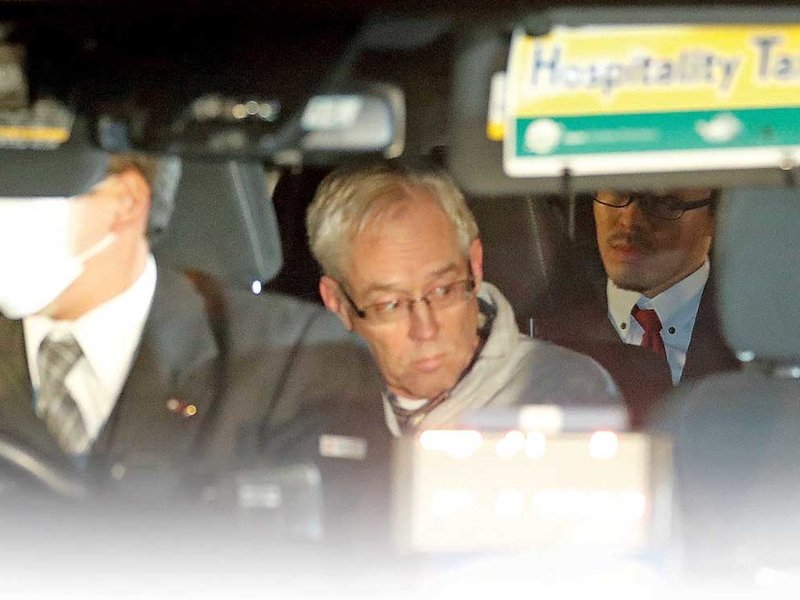
TOKYO — Greg Kelly, the Nashville auto executive fingered by Nissan as the “mastermind” of Carlos Ghosn’s alleged compensation misconduct, is rolling out a detailed defense ahead of his pending trial in Japan, and international pressure is mounting to bring attention to his legal battle.
Kelly claims that Nissan money earmarked for Ghosn was not part of a scheme to provide the automaker’s ousted chairman deferred compensation, as Nissan Motor Corp. and Japanese prosecutors allege.
Instead, Kelly, who rose from Nissan’s top U.S. human resources executive to become an alliance executive vice president and eventually a director on Nissan’s board in Japan, said it was a legal draft of a postretirement contract intended to keep Ghosn as an adviser to the Japanese carmaker and prevent him from bolting to a competitor.
Writing in a recent commentary for Japan’s Bungei Shunju news journal, Kelly added that the contracts in question, devised in 2011, 2013 and 2015, were never signed by Ghosn. The accords were designed to be signed by him and whoever was the CEO at the time of Ghosn’s retirement.
Kelly wrote in the Japanese-language publication that under the terms of the drafts, Ghosn would become a special adviser and honorary chairman for 10 years after stepping down. He would receive a one-time payment of ¥3 billion ($29.3 million), and annual payouts of between $2.9 million and $4.9 million.
Kelly, 63, whose home is in the Nashville suburb of Brentwood, Tenn., near the automaker’s North American headquarters, was arrested in Tokyo on the same day as Ghosn in November 2018. Prosecutors accuse Kelly of helping to conceal more than $80 million in deferred remuneration to Ghosn over the 2010-17 fiscal years and, in violation of Japan’s financial and exchange laws, without properly reporting it in financial filings.
Both Ghosn and Nissan as a corporate entity were charged with the same offense. Kelly and Ghosn have maintained their innocence, but Nissan has not disputed the charge.
The complex case is now drawing international support for the former Nissan director, who spent the last few years of his career working in Japan for the automaker. As he awaits trial on bail, he is prevented from leaving Japan and has been living in a Tokyo apartment, where he has been joined by his wife from Nashville. But there is no date for the trial.
His lawyer, Yoichi Kitamura, told Automotive News last week that the trial, originally expected to begin in April, was postponed to give both sides more time to collect and sort evidence.
The legal ordeal that began on Thanksgiving week in 2018 took a turn for the worse at the end of 2019 when Ghosn, Kelly’s co-defendant, jumped bail and fled in secrecy to Lebanon, his ancestral homeland. That left Kelly to stand trial alone in Japan for issues pertaining to Ghosn.
Three U.S. senators published a letter in support of Kelly. Sens. Roger Wicker of Mississippi and Lamar Alexander and Marsha Blackburn of Tennessee called Kelly’s predicament a “cautionary tale” for Americans working in Japan. Alexander was governor of Tennessee when Nissan agreed to build its first U.S. plant in Smyrna, Tenn., in 1980, almost 20 years before Ghosn joined the company.
The open letter said Kelly’s situation undermines bilateral trust and raises “serious questions about whether non-Japanese executives can comfortably work in Japan under its legal system.
“If Americans and other non-Japanese executives question their ability to be treated fairly in Japan, then that most important bilateral relationship in the world is at risk,” the American lawmakers said in the commentary, March 10 in Real Clear Politics.
Ghosn has also taken up Kelly’s cause. In a recent interview with Automotive News, Ghosn urged the U.S. government to pressure Japan for Kelly’s release.
“The only government that can influence the Japanese government is the U.S. government. There is no other,” Ghosn said. He recently retweeted an online petition to free Kelly.
“Frankly, I wish the U.S. government would put a little bit more pressure to relieve Greg from the nightmare,” Ghosn said.
A Change.org petition was started by Kevin Kelly, the executive’s son, to ask Washington to “push for a resolution” that allows Kelly to immediately return to the U.S.
It argues that the dispute over Ghosn’s retirement should have been handled as an internal corporate matter, not a criminal one.
It cites a January report in Japan’s Mainichi newspaper saying Prime Minister Shinzo Abe also wanted Nissan to handle the issue internally.
As of last week, the petition had 5,260 signatures.
“My father, Greg Kelly, has been trapped in Japan for the past 15 months, a victim of Japan’s draconian justice system,” the petition says.
Kevin Kelly wrote in a March 9 update that the trial likely will begin this summer, after a third delay.
“My father will return from Japan by fall 2021 at the earliest,” he wrote. “He will have arrived in Japan a 62-year-old man and leave at 65. He will have missed the birth of his second grandson as well as three years of life with his family.”
In Kelly’s commentary for Bungei Shunju, published in Japanese, he said he was stunned when he woke up Dec. 31 to learn of Ghosn’s escape.
“I was shocked,” Kelly said. “I was thinking that Mr. Ghosn’s testimony would be a strong piece of evidence to prove my innocence. But Mr. Ghosn is gone.”
Naoto Okamura contributed to this report.